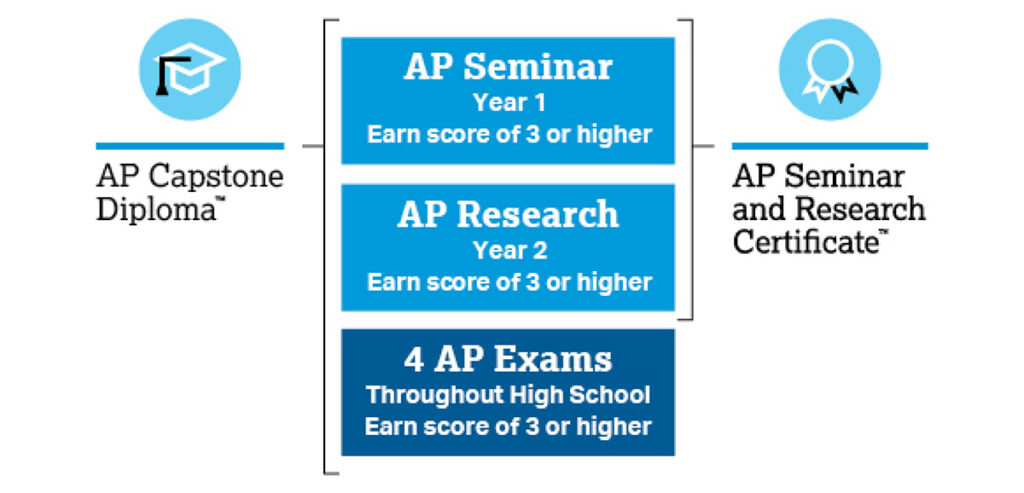
An overview of AP Capstone Program
The AP Capstone program is a two-year program offered by the College Board that requires students to complete two AP courses: AP Seminar and AP Research paired with four additional AP classes of their choice. This program is designed to provide students with college-level research, writing, and presentation skills that are essential for success in college and beyond.

The Benefits of AP Capstone Program
The AP Capstone Program offers several benefits to high school students. Here are five key advantages of participating in the AP Capstone Program:
- Critical Thinking and Research Skills: The AP Capstone Program is designed to develop critical thinking, research, and analysis skills. Students engage in independent research projects, evaluate multiple sources, and construct arguments based on evidence. These skills are essential for success in college and beyond, as they enhance problem-solving abilities and the ability to think critically in various academic and professional contexts.
- Interdisciplinary Approach: The AP Capstone Program promotes an interdisciplinary approach to learning. It allows students to explore connections between different subject areas and develop a holistic understanding of complex issues. This interdisciplinary perspective encourages students to think beyond the boundaries of individual disciplines, fostering creativity, innovation, and a broader perspective on real-world problems.
- College Readiness: The rigorous coursework in the AP Capstone Program prepares students for the academic challenges they will face in college. By engaging in advanced research projects, collaborating with peers, and analyzing complex texts, students develop the skills and mindset necessary for success in higher education. The program cultivates the intellectual curiosity, self-discipline, and time management skills needed to excel in college-level coursework.
- Enhanced Communication Skills: The AP Capstone Program emphasizes effective communication skills, both written and oral. Students learn to express their ideas clearly, construct persuasive arguments, and communicate complex concepts. Through presentations, group discussions, and written assignments, students refine their communication abilities, which are crucial in college, professional settings, and everyday life.
- College Credit and Scholarships: Similar to the regular AP program, successful completion of the AP Capstone Program can lead to college credit and advanced standing. Many colleges and universities recognize the rigor of the program and grant credit or placement to students who achieve a certain score on the AP exams. Additionally, the unique experience of completing the AP Capstone Program can make students more competitive for scholarships and other academic opportunities.
These benefits of the AP Capstone Program provide students with valuable skills, knowledge, and credentials that can support their academic and professional pursuits.

AP Capstone focuses on developing research,
critical thinking, and communication skills, which
are essential to success in college and beyond.

How AP Capstone works

- AP Seminar: In the first year of the program, students take AP Seminar, which focuses on developing research, critical thinking, and communication skills. The course explores real-world issues from multiple perspectives and requires students to analyze and evaluate various sources, arguments, and evidence. Students engage in collaborative team projects, deliver presentations, and write research-based essays. The course culminates in an individual research-based written exam, where students present and defend their research findings.
- AP Research: In the second year of the program, students move on to AP Research, which builds upon the skills developed in AP Seminar. In this course, students design, plan, and conduct a year-long research project on a topic of their choice. They work independently under the guidance of a teacher and a mentor. Throughout the research process, students investigate their research question, gather and analyze data, and present their findings through a written thesis and an oral defense. The final research project is evaluated by a panel of experts.
To earn the AP Capstone Diploma, students must successfully complete both AP Seminar and AP Research, as well as four additional AP courses of their choice. However, students can also choose to take AP Seminar and AP Research as standalone courses without pursuing the full AP Capstone Diploma.
The AP Capstone Program provides students with an opportunity to develop critical thinking, research, collaboration, and communication skills that are highly valued in college and beyond. It prepares students for the rigors of higher education by fostering independent research, interdisciplinary connections, and the ability to effectively analyze and evaluate complex issues.
FAQs
The AP Capstone Program differs from the regular AP program in several key ways:
- Structure: While the regular AP program consists of individual subject-specific courses and exams, the AP Capstone Program is a two-year program that includes two specific courses: AP Seminar and AP Research. These courses are designed to complement and build upon each other, focusing on interdisciplinary skills, research, and critical thinking.
- Interdisciplinary Approach: The AP Capstone Program emphasizes an interdisciplinary approach to learning and problem-solving. It encourages students to make connections across different subject areas and explore complex issues from multiple perspectives. In contrast, the regular AP program focuses on subject-specific content and assessments.
- Research Emphasis: The AP Capstone Program places a strong emphasis on research skills. In AP Seminar, students engage in collaborative and independent research projects, learning to evaluate sources, construct arguments, and communicate their findings effectively. AP Research takes this further by guiding students through a year-long independent research project, requiring them to design, conduct, and present their own research.
- Culminating Assessments: In the regular AP program, students take subject-specific exams at the end of each course to demonstrate their knowledge and skills. In the AP Capstone Program, the culminating assessments are the AP Seminar exam and the AP Research project. These assessments assess students’ ability to analyze complex issues, conduct research, and communicate effectively.
- AP Capstone Diploma: The AP Capstone Program offers the opportunity to earn the AP Capstone Diploma upon successful completion of both AP Seminar and AP Research, along with four additional AP courses of the student’s choice. The regular AP program does not offer a specific diploma but allows students to earn college credit based on their performance on individual AP exams.
Overall, the AP Capstone Program provides a unique and comprehensive experience that combines interdisciplinary learning, research skills, and critical thinking, setting it apart from the subject-specific focus of the regular AP program.
The AP Capstone program aims to develop a range of skills and abilities in students. Here are five key skills that the program focuses on:
- Critical Thinking: The program encourages students to think critically by evaluating information, analyzing complex issues, and considering multiple perspectives. Students learn to question assumptions, identify biases, and construct well-reasoned arguments based on evidence.
- Research Skills: AP Capstone emphasizes the development of strong research skills. Students learn how to design and conduct research studies, gather and analyze data, and draw meaningful conclusions. They also learn to evaluate sources, synthesize information, and effectively communicate their research findings.
- Communication Skills: The program focuses on honing effective communication skills, both written and oral. Students learn to articulate their ideas clearly, present complex information persuasively, and engage in constructive dialogue. They also develop the ability to communicate research findings in a coherent and impactful manner.
- Collaboration: AP Capstone fosters collaboration skills by engaging students in group projects and discussions. Students learn to work effectively in teams, respect diverse perspectives, and actively contribute to collective decision-making. Collaboration skills are vital for success in academic, professional, and personal contexts.
- Time Management and Organization: The program helps students develop strong time management and organizational skills. With the demanding coursework and research projects, students learn to prioritize tasks, meet deadlines, and balance multiple responsibilities. These skills are essential for academic success and lifelong learning.
By focusing on these skills and abilities, the AP Capstone program equips students with the tools needed to thrive in college and beyond. These skills enhance their critical thinking, research proficiency, communication effectiveness, collaborative capacity, and ability to manage their time and resources effectively.
Yes, colleges and universities recognize the AP Capstone program. The program is developed by the College Board, the same organization responsible for the AP program, which is widely recognized and respected by higher education institutions. Colleges and universities value the rigorous curriculum, research skills, and interdisciplinary approach that the AP Capstone program offers. Successful completion of the AP Capstone program, including the AP Seminar and AP Research courses, can demonstrate a student’s readiness for the academic challenges of college and may be considered favorably during the admissions process. Additionally, some colleges and universities grant credit or advanced standing for the AP Capstone courses and exams, similar to the regular AP program, allowing students to potentially earn college credit for their efforts.











